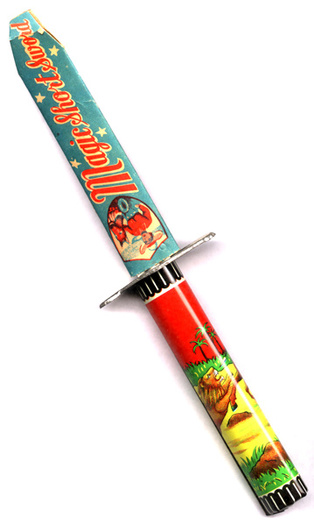 Illustration of a sword which I believe is just as Roman and just as magical as Pulitzer's sword. It is in a private collection in Brooklyn (see below).
Illustration of a sword which I believe is just as Roman and just as magical as Pulitzer's sword. It is in a private collection in Brooklyn (see below). "What is this special quality? The sword has an ancient ocean navigational device built into it which causes the sword to point true north. Such magnetic qualities are only found in authentic items of antiquity, not cast iron or manufactured stone replicas."
I'm not even sure what to say about that. Magnetic properties are something about the sword that is testable, I suppose, so that's another claim to add to the pile. Maybe Pulitzer's special TreasureForce XRF has a magic-detecto-meter in it. Right beside the decoder ring. Who knows. I'm just going to leave it alone.
I will note, however, that the association of the Hercules figure on the sword with magnetism is also discussed by the owner of the Florida sword. Pulitzer calls the Florida sword "a perfect litmus test for the Oak Island Roman sword," saying it is one of four that have now been "verified."
Pulitzer says a few other things about the sword that are of note, but doesn't add much to the narrative that we didn't already know.
He repeats the assertion that up to ten of these swords were made, though still providing no information about where that assertion comes come (previously he has cited both "history" and "legend"). He seems to be saying that some emperor (he doesn't say which, but presumably he is referring to Commodus) made ten Hercules gladiator ceremonial swords to hand out as year-end bonuses at the Imperial office party.
In addition to the Florida sword and the Nova Scotia sword, Pulitzer includes in his "authentic group" a "famous attraction in Naples that the museum commissioned a foundry cast iron replica to be made." This lines up with my speculation that the "source" of the swords would be the Naples/Pompeii/Herculaneum region.
One of the expectations of my hypothesis that the brass/bronze swords are all of recent manufacture is that there is no authentic, original Roman sword of this design. Pulitzer could attempt to prove me wrong by identifying his supposed "famous attraction" sword (it's so famous, apparently, that no-one has yet been able to find an image of it online or by inquiries made to the Naples Museum). Can you provide an image? Can you give us a museum number? Can you point us to a brochure, book, or other publication? Can you provide any clue as to where we can learn something about this "famous" sword from some source other than your blog posts?
Pulitzer once again ducks the important issue of the California sword and the Italian Ebay sword, focusing on pointing out (again) that the Design Toscano swords are not "real." We know that. Those swords (currently being produced) aren't really the problem for Pulitzer's thesis that the the brass/bronze swords are authentic. The California and Ebay swords are, however, because they appear to be examples of brass/bronze swords made from the mold as Pulitzer's "authentic" sword. As far as I know, he has never tried to explain the California or Ebay swords, preferring to try to confuse the issue by attacking the Design Toscano swords as a straw man.
Nothing that Pulitzer said in his post changes my gut feeling that my hypothesis is essentially correct: these brass/bronze swords are recent creations with no ancient Roman "model." Pulitzer has asserted that the location of the "original" sword is Naples, but has not provided any evidence to back up that assertion. He has asserted that the sword has been "verified," but he has provided no additional information that leads me to believe that any credible expert has looked at the sword firsthand and concluded that it is genuine. My guess is that he pointed his XRF at it (oh my! it's brass!) and solicited an opinion of "it looks it could be Roman to me" from someone somewhere. Is that all there is? If not, then prove me wrong.
If that's all there is, that's an incredibly weak foundation for the argument that you're going to change history.
Note: The image of the sword used in this blog post is from this page. I think it's a good stand-in: it's just as much a functional sword as the Nova Scotia sword; it's just as Roman as the Nova Scotia sword; and it's just as magical as the Nova Scotia sword. Pulitzer insists that he owns the image of the "Roman magical sword" (although he has yet to provide me with any evidence to that effect) and has denied me permission to use it. If you can't beat 'em, sue 'em!


 RSS Feed
RSS Feed
